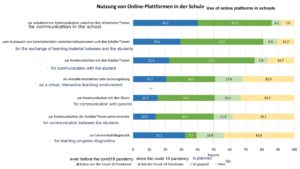
Views: 1
– If many schools lacked the experience and know-how to deal with digital learning before schools closed in March 2020, the corona pandemic triggered a real increase in digitization. According to an ongoing study by UZH, primary schools and also schools with a large number of children with difficulty learning at home were particularly challenged. Not only these students, but schools also need additional support.
Courtesy UZH: The Covid 19 pandemic presented Swiss schools with great challenges that were very stressful not only for children and teachers, but also for school administrators. From his point of view, with a lot of effort and various measures, most schools were able to deal with the exceptional situation satisfactorily. This is shown by a first survey of 299 school principals in German-speaking Switzerland, under the leadership of UZH education teacher Katharina Maag Merki.
New concepts for digital learning
Until March 2020, digital learning in the classroom was not a major problem: one third of respondents said they had little or no experience before schools closed. Online platforms were probably used for internal communication, but at most one in three schools for teaching. In primary schools, the level of experience in digital learning was again significantly lower than in secondary schools.
The situation has visibly changed with the pandemic: at least half, in some cases up to 80 percent, of schools now also use online platforms to teach, to exchange learning materials and to communicate with students, parents or children among themselves.
“In order for this momentum towards digitalization not to diminish, more concepts for effective digital education must be developed – especially at the primary level,” says Maag Merki. “For this, it is necessary to invest in training and continuing education for teachers and managers”.

School leaders are challenged, overwhelmed and want support
Support is clearly desired by school managers: two thirds of them need support with distance learning, with the combination of the face-to-face and self-study phases and support for children with special needs. Here, too, it can be seen that the demand in primary schools is significantly higher than in secondary schools.
Consequently, the burden was greater here: nine out of ten primary school administrators found the blocking period stressful, while three quarters of those interviewed in secondary schools.
The biggest challenges included providing emotional and motivational support for students and children who were unable to study well at home. 80 percent of school principals with a high proportion of such students found it difficult to provide the necessary assistance, while in schools with a lower proportion it was just over 50 percent.
Another problem was the workload of teachers at the school itself. “For school principals, handling the different digital skills of teachers was particularly important,” says Maag Merki.
Satisfied to deal with the exceptional situation so far
To address the challenges posed by the corona, schools have taken many steps: for example, they have established common goals, created in-school task forces, ensured that teachers with experience in digitization support their colleagues, have experimented with various distance learning methods and they agreed with the team on important topics and emergency measures developed for children in particular need of support.
Thanks to this effort, 60% of the administrative staff are satisfied and 30% are very satisfied with the way in which the school blockade and reopening were managed.
Commitment from authorities, universities , professors and managers
According to Katharina Maag Merki, there are clear general differences between schools: “At the primary level, it seems to be more difficult to find good solutions to digital challenges.
Schools with many children who are unable to study well at home also face problems and need additional support. “The results of the second survey in February / March 2021 will show how schools are dealing with the pandemic in the long term and what additional obstacles arise – for example, due to quarantined teachers.
“It takes the commitment and competence of all those responsible for the educational system so that students can achieve their learning objectives despite the Corona”, emphasizes Maag Merki. They think of providing the necessary hardware and software or ideas for digital learning, as they came in abundance in practice and in teacher training universities in recent months. The authorities have a special role to play: “If their demands are considered contradictory and difficult to implement in everyday school life, stress in schools also increases”.
The study «S-CLEVER. School development in the face of new challenges »
The “S-CLEVER” study is being carried out in Switzerland, Germany and Austria by a consortium of Universities in Zurich, Mainz, Rostock, Heidelberg, Klagenfurt and the Leibniz Institute for Educational Research and Educational Information with financial support from the Jacobs Foundation and Robert Bosch Foundation (www.s-clever.org).
In Switzerland, headed by Katharina Maag Merki, a professor at the UZH Institute of Educational Sciences, principals of primary, secondary and secondary schools are interviewed. This happens in the German-speaking cantons of Aargau, Lucerne, St. Gallen, Thurgau and Zurich three times in the 2020/21 school year. The results presented are based on the first surveys of September 2020, in which 299 people participated (64% of elementary school, 25% of high school, 10% of elementary and high school, 1.3% of high school).
The sample is representative of the distribution of school levels and regions (city, country) in the selected cantons and represents 58% of pupils in Swiss German-speaking primary schools.
About details of the study:
To ensure the learning and well-being of all internal students *, schools faced several challenges, some of which lack skills, among others, teachers and students * internally with regard to the use of digital platforms, lack of resources , providing support documents for distance learning, support options for students, communicating with students and parents via distance learning or running schools under special risk conditions.
Objective of the study
The aim of the S-CLEVER study is to examine the schools’ experiences with this extraordinary situation. The focus is on action strategies and changes during and after school closings, as well as their effects on school and student development.
Key issues
- What challenges did schools face in relation to the Covid pandemic 19 and which ones do they face in the current school year?
- What strategies have schools used to address these challenges?
- What long-term school and educational solutions have you developed and which are particularly suitable and cost-effective?
- What lasting effects do these approaches have on school practice and student learning?
- What factors influence the development processes in the school and their results?
What will be done
The study begins with a survey of heads of general education schools. In the 2020/2021 academic year, there will be three surveys with an online questionnaire (each takes about 30 minutes).
Participation is voluntary. Data evaluation is completely anonymous and takes into account the strict data protection rules. In a second stage, if schools are interested, teachers and specialists, as well as long-term students, should be included.
1 Survey with school principals: September / October 2020
2 Research with school principals: February to March 2021
3 Survey with school principals: May to June 2021
Evaluation of the added value of school administrators
- In January 2021, respondents will receive a report on the results with country-specific assessments and examples of best practices.
- In regional workshops, the results are discussed with school principals and representatives of educational policy and administration, as well as the consequences for support and continuing education.
- In the summer of 2021, all school principals will receive individual feedback compared to the overall national and trinational sample.
- In the fall of 2021, the overall results will be presented and discussed in regional workshops with school principals and representatives of educational policy and educational administration, as well as the consequences for support and continuing education.
Related article: Stanford – Computer model that predict how COVID-19 infections spreads